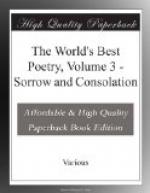Their mirth and their employments, and shall come
And make their bed with thee. As the long train
Of ages glide away, the sons of men—
The youth in life’s green spring, and he who goes
In the full strength of years, matron and maid,
And the sweet babe, and the gray-headed man—
Shall, one by one, be gathered to thy side
By those who in their turn shall follow them.
So live, that when thy summons comes to join
The innumerable caravan that moves
To the pale realms of shade, where each shall take
His chamber in the silent halls of death,
Thou go not, like the quarry-slave at night,
Scourged to his dungeon, but sustained and soothed
By an unfaltering trust, approach thy grave
Like one who wraps the drappery of his conch
About him, and lies down to pleasant dreams.
WILLIAM CULLEN BRYANT.
A MORNING THOUGHT.
What if some morning, when the stars were paling,
And the dawn whitened, and the east was
clear,
Strange peace and rest fell on me from the presence
Of a benignant spirit standing near;
And I should tell him, as he stood beside me:—
“This is our earth—most
friendly earth, and fair;
Daily its sea and shore through sun and shadow
Faithful it turns, robed in its azure
air;
“There is blest living here, loving and serving,
And quest of truth, and serene friendships
dear:
But stay not, Spirit! Earth has one destroyer—
His name is Death: flee, lest he
find thee here!”
And what if then, while the still morning brightened,
And freshened in the elm the summer’s
breath,
Should gravely smile on me the gentle angel,
And take my hand and say, “My name
is Death”?
EDWARD ROWLAND SILL.
NOW AND AFTERWARDS.
“Two hands upon the breast,
and labor is past.”
—RUSSIAN PROVERB.
“Two hands upon the breast,
And labor’s done;
Two pale feet crossed in rest,—
The race is won;
Two eyes with coin-weights shut,
And all tears cease;
Two lips where grief is mute,
Anger at peace:”
So pray we oftentimes, mourning our lot;
God in his kindness answereth not.
“Two hands to work addrest
Aye for his praise;
Two feet that never rest
Walking his ways;
Two eyes that look above
Through all their tears;
Two lips still breathing love,
Not wrath, nor fears:”
So pray we afterwards, low on our knees;
Pardon those erring prayers! Father, hear these!
DINAH MARIA MULOCK CRAIK
THE GRAVE OF SOPHOCLES.
Tenderly, ivy, on Sophocles’ grave—right
tenderly—twine
Garlanding over the mound network of delicate green.




